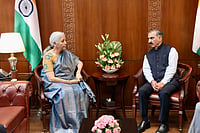There was harmonious coexistence between wildlife and indigenous communities living close to nature for sustenance and resources but the relationship has undergone profound changes over the years due to urbanisation and other reasons, Assam Governor Gulab Chand Kataria has said.
Kataria said this while addressing an event to celebrate the golden jubilee of Project Tiger on Global Tiger Day at Manas National Park on Saturday, according to a press statement. The Assam governor highlighted the immense value of Manas as one of India's significant reserves and emphasised the utmost importance of preserving tigers.
Delving into the intricate relationship between humans and wildlife that has evolved over time, the governor said there was harmonious coexistence with indigenous communities living close to nature for sustenance and resources in the past. However, with the rapid growth of human population, industrialisation and urbanisation, this relationship has undergone profound changes, he said.
In his address, Bodoland Territorial Council Chief Executive Member Pramod Boro said India has emerged as a global leader in tiger conservation. Boro mentioned Prime Minister Narendra Modi's message that emphasised the inseparable link between protecting the forests and safeguarding the tiger population. He stressed on the issue of global warming, which is largely attributed to deforestation, making the preservation of forests crucial in combating this challenge.
Manas National Park had in the past suffered from the ruthless actions of poachers, leading to the loss of precious flora and fauna, Boro said, adding that today, the collaborative efforts of the Assamese, Boro and Adivasi communities, along with the support of NGOs, have played a pivotal role in saving this ecosystem. Among the biggest tiger reserves in the country, Manas National Park plays a significant role in preserving the big cats in India.
One of the oldest wildlife sanctuaries in India, it was declared among India's first tiger reserves under Project Tiger in 1973. Subsequently, Manas National Park was declared a world heritage site by UNESCO for outstanding universal conservation value.
With a large area of 2,837.12 square kilometres, it was declared a biosphere reserve in 1989 and, in 1990, designated as a national park with a core area of 500 square kilometres. The administration of the Bodoland Territorial Region, under the leadership of Boro, is making concerted efforts to strengthen integrated forest and wildlife management in the region, the statement said.


























